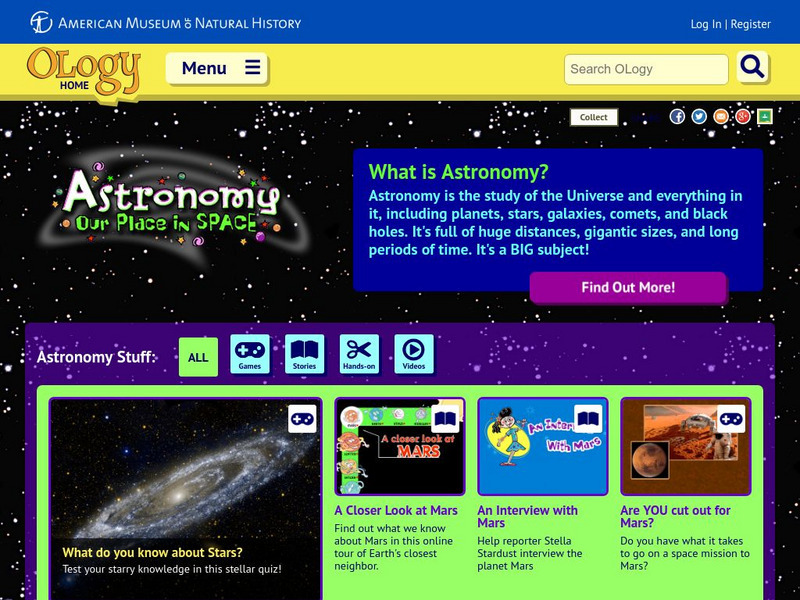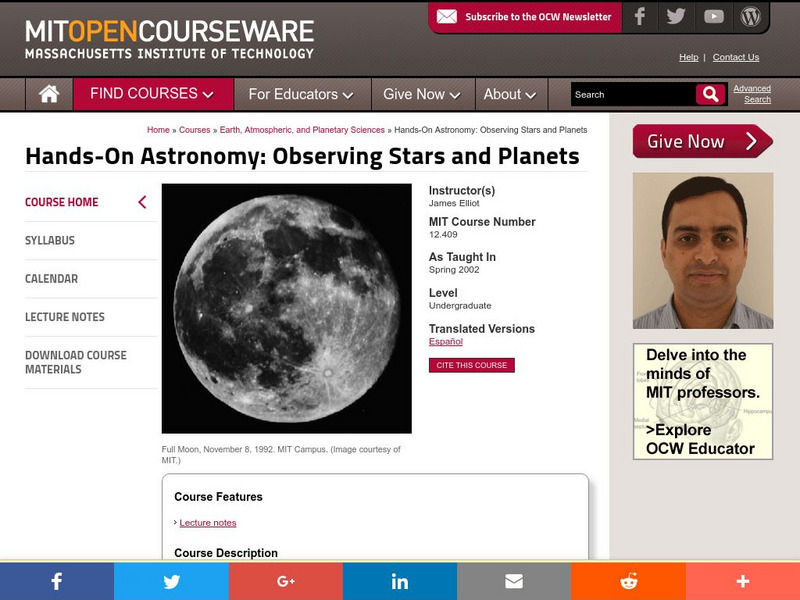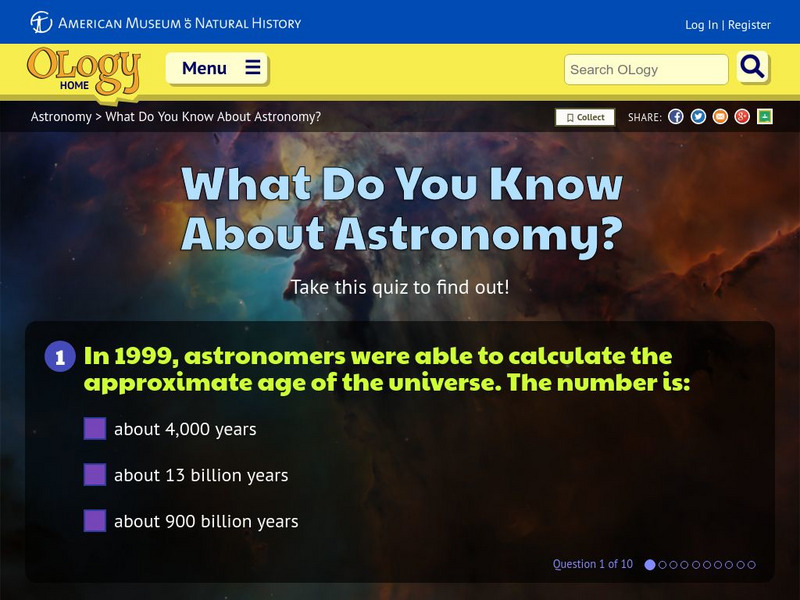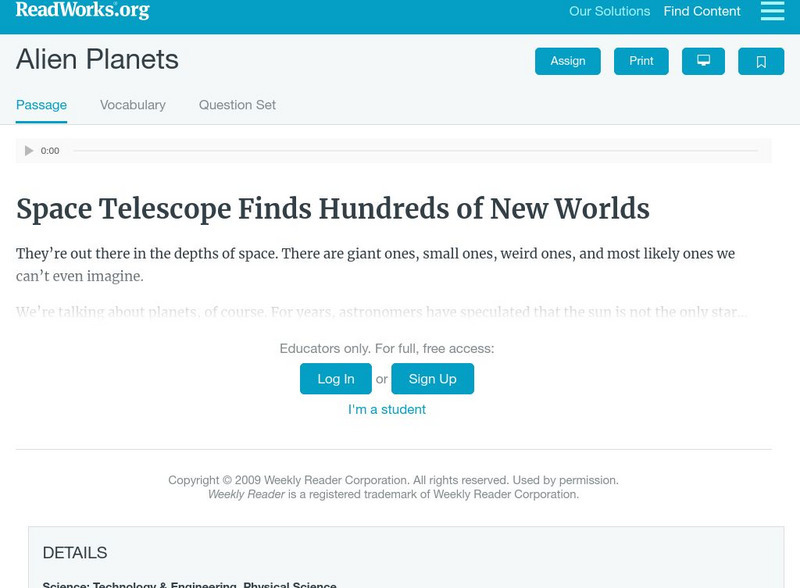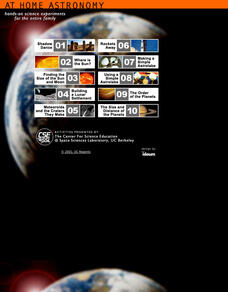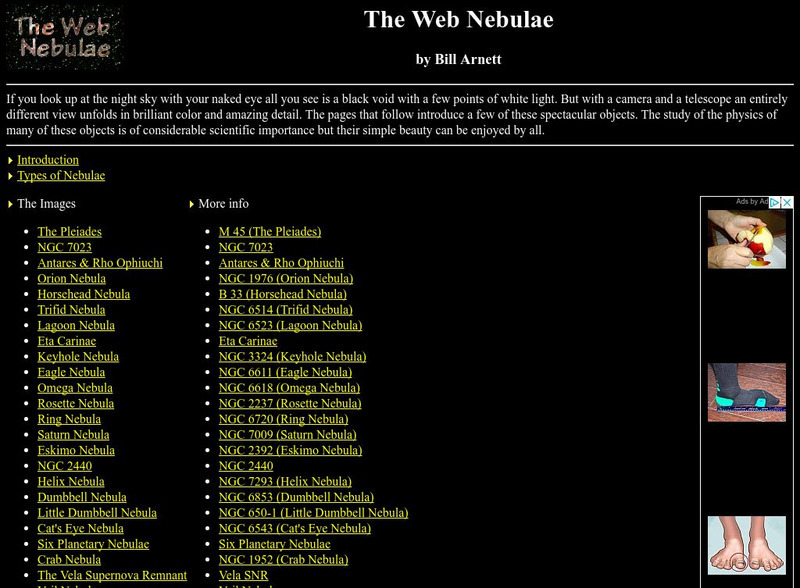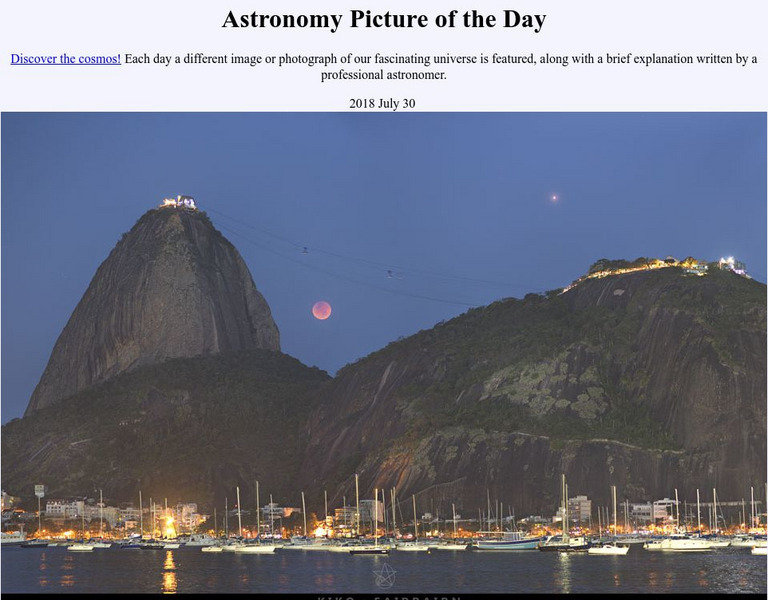Enchanted Learning
Enchanted Learning: Zoom Astronomy: All About Space
A fantastic collection of information about the solar system. Includes information on all of the planets, the moon, the sun, asteroids, comets, meteoroids, and stars. Also find puzzles, a dictionary, quizzes, classroom activities, and...
American Museum of Natural History
American Museum of Natural History: O Logy: Astronomy: Our Place in Space
This resource is a place for learning all about astronomy--stargazing, planets, space science, and interesting astronomical phenomena and discoveries. Explore, ask questions, find information, and meet American Museum of Natural History...
Georgia Department of Education
Ga Virtual Learning: A Brief History of Astronomy
In this interactive module students will explore what different ancient cultures believe was an explanation of the stars and planets. They will look at how the work of Nicolas Copernicus revolutionize the world of astronomy and learn how...
Massachusetts Institute of Technology
Mit: Open Course Ware: Hands on Astronomy: Observing Stars and Planets
A university-level course in basic observational procedures in astronomy. Covers how to use a telescope, and includes lecture notes.
American Museum of Natural History
American Museum of Natural History: O Logy: What Do You Know? Astronomy
Take this ten-question self-scoring quiz to test your knowledge of astronomy facts: age of the universe, why stars and planets are spheres, where other life might exist in the outer space, the Milky Way, and more.
Read Works
Read Works: Alien Planets
[Free Registration/Login Required] This nonfiction piece discusses the discovery of previously unknown planets in the solar system. This passage is a stand-alone curricular piece that reinforces essential reading skills and strategies...
Other
The Astronomy Cafe
NASA scientist Sten Odenwald calls this his "web site for the astronomically disadvantaged." Do you have lots of questions about space that you can't seem to get answers to? Would you like to learn about a career in astronomy, Big Bang...
University of California
At Home Astronomy: Hands on Science Experiments for the Entire Family
A collection of ten hands-on science experiments for the entire family that will help you understand concepts in astronomy. Make an astrolabe, find the size of the sun and moon, build a lunar settlement, find out about meteoroids, shadow...
NASA
Nasa: Kepler: A Search for Habitable Planets: Transit Tracks
Classroom lesson for teaching astronomy uses PowerPoint presentations and illustrations of Kepler's light curves used to discover planets.
Georgia Department of Education
Ga Virtual Learning: Astronomy: The Earth
In this interactive tutorial students will learn what causes the seasons, diurnal cycles and how the constellations move through the sky. Learn we are able to see other planets and how astronomical events affected life on the Earth.
American Geosciences Institute
American Geosciences Institute: Astronomy
Eight hands-on lessons module in which students explore the characteristics of planet Earth, its moons, the sun, the solar system, planets, and the difference between science fact and science fiction.
Enchanted Learning
Enchanted Learning: Zoom Astronomy
Where is our Solar System? How far away is the sun? What makes up the sun? Find out all you want to know about our solar system. This is a comprehensive on-line site about space and astronomy. Check out all of the excitement!
ClassFlow
Class Flow: Astronomy Planets
[Free Registration/Login Required] The student will be able to compare and contrast the similarities and differences of the planets. The student will be able to name three facts about inner planets and three facts about outer planets.
Ducksters
Ducksters: Astronomy for Kids: Space Exploration Timeline
Kids learn about the timeline of the history of space exploration including early astronomy, astronauts, spacecraft, planets, and the Moon.
Cornell University
Cornell University: Astronomy: Orbital Motion and Kepler's Laws
At this site from the Astronomy Department of Cornell University, Kepler's three laws of planetary motion are stated. There are brief explanations of each, along with links to additional information on related subjects.
Nine Planets
Nine Planets: The Web Nebulae
This site from Nine Planets provides introductory material about nebulae, information and images of several types of nebulae, information on Edwin Hubble, and additional related sites are provided.
Other
Sunaeon: Solar System Scope
Experience the solar system as you've never seen it before; up close and personal. Visit each planet by clicking on it, then selecting the play button to track its rotations through the calendar year. Watch the constellations move...
National Earth Science Teachers Association
Windows to the Universe
Windows to the Universe has developed an interactive resource about the earth, space, biological and physical sciences. Content includes information on our planet, the solar system, the universe, myths associated with space, space...
NASA
Nasa: Astronomy Picture of the Day:
A different image is featured each day along with descriptive narrative. NASA offers different and sometimes unexpected views of our Earth and the universe.
NASA
Nasa: Astronomy Picture of the Day: Uranus's Moon Umbriel
Brief overview of Umbriel from NASA. Answers the question "why is the moon so dark"? Provides additional links for more information. A NASA picture of the day.
Other
Kid Power: Astronomy for Kids
Young children can find facts about the Solar System, the Sun, meteorites, stars, galaxies, planets, our moon, comets, asteroids, and space exploration. Pages offer clear photos and bullet-point information, which is easy to read and...
Wolfram Research
Wolfram Science World: Science World of Astronomy: Snc Meteorites
View a chart displaying various kinds of meteorites collected on earth and read a technical article describing the manner in which they are studied. Provides a link to more information about the planet Mars and the role it plays in the...
Other
Astromador: Astronomia Para Amadores
This resources focuses exclusively on astronomy. It's packed with historical facts about space exploration, famous people who pioneered the study of stars and planets. It features chronological list of space exploration, current news,...
Other
Canal Kids: Ciencias (Science for Portuguese Speakers)
Colorful, engagingly written information about astronomy and biology for Portuguese-speaking English language learners. Both subjects are broken down into a broad array of related subtopics. The biology section is particularly helpful...

